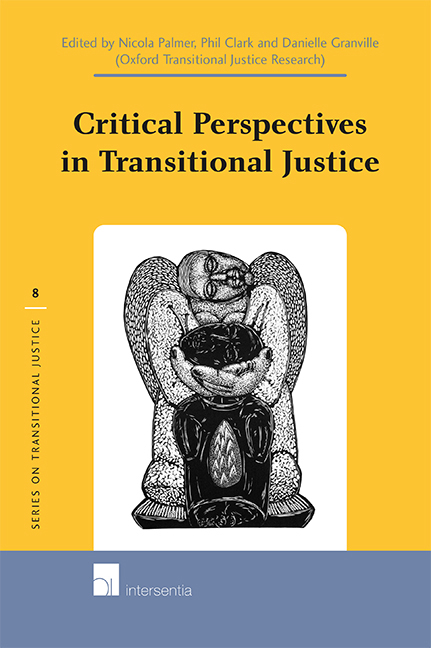Book contents
- Frontmatter
- Note
- Acknowledgements
- Contents
- Abbreviations
- Introduction
- Section 1 Critiquing Core Concepts in Transitional Justice
- Section 2 Accountability, Human Rights and the Rule of Law
- Section 3 Locality and Legitimacy
- Section 4 Memory, Ritual and Apology
- Section 5 Transitional Justice After Transition
- Contributors’ Biographies
- Series on Transitional Justice
2 - Transitional Justice as Retribution: Revisiting its Kantian Roots
Published online by Cambridge University Press: 22 December 2020
- Frontmatter
- Note
- Acknowledgements
- Contents
- Abbreviations
- Introduction
- Section 1 Critiquing Core Concepts in Transitional Justice
- Section 2 Accountability, Human Rights and the Rule of Law
- Section 3 Locality and Legitimacy
- Section 4 Memory, Ritual and Apology
- Section 5 Transitional Justice After Transition
- Contributors’ Biographies
- Series on Transitional Justice
Summary
INTRODUCTION
The lifting of Martial Law in Taiwan in 1987 elicited demands for official recognition of human rights violations committed by the previous authoritarian regime of the Kuomintang (KMT). Although some efforts were made by the KMT government in response to those demands, by 2000 demands for justice were increasingly prevalent. The major criticism being voiced was that the democratic transition in Taiwan was a ‘transition without justice’. As Nai-teh Wu points out, ‘transitional justice in Taiwan was pursued only by providing reparations to the victims but without tackling the greater issues of retributive justice against the perpetrators and of historical rectification.’ For Wu, this is a lack of justice because ‘the question of who was responsible for the political repression and gross violations of human rights has seldom been posed.’
This strong demand for retributive justice in Taiwanese society was finally forged into a political project – the ‘De-Chiang Kai-shek’ movement – to impute culpability to those deemed responsible for atrocities. However, instead of satisfying these demands, this project only revealed a diversity of opinions and generated even wider debate. Some criticised the movement for failing to articulate an adequate retributive approach, dressing up as justice a primitive impulse of revenge. Others expressed concern about the whole approach of searching for retributive justice in a period of democratic transition, arguing that the emphasis on past wrongs that guides the pursuit of retribution had the potential to polarise an already divided society. They worried that it could itself become ‘a stumbling block for consolidating democracy’ in Taiwan.
The controversy aroused by this project in Taiwan echoes broader normative concerns about the necessity and legitimacy of retribution for past wrongs as a requirement for transitional justice. Some theorists, as pointed out by Ruti Teitel, claim that retribution through ‘successor trials’ plays a vital role in laying the basis for a new liberal order:
Contemporary theorizing largely justifies punishment in transition for its potential role in constructing a newly democratic political order. Successor trials are said to be politically useful in drawing a line between regimes, advancing the political goals of the transition by delegitimating the predecessor regime, and legitimating its successor.
- Type
- Chapter
- Information
- Critical Perspectives in Transitional Justice , pp. 31 - 50Publisher: IntersentiaPrint publication year: 2012
- 1
- Cited by

